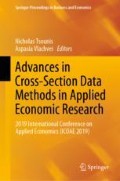Abstract
The purpose of this work is to examine the association between corporate governance and the financial decision-making process in the areas of tax planning and tax optimization. Specifically, the paper aims at analyzing the impact of moving the Slovak companies’ registered office to a tax haven on their future financial position. We have performed statistical testing of selected bankruptcy indicators in Slovak companies. We have compared Altman Z´ score and Index IN05 between Slovak companies with ownership links to selected tax havens (2314) and Slovak companies with no ownership links to tax havens (157,480). For a deeper analysis we have divided tax havens into three categories, onshore, midshore and offshore jurisdictions and performed statistical testing between companies in each of these categories and companies with no ownership links to a tax haven. We have obtained the financial data of all Slovak companies from financial statements provided by Finstat and we have matched this data with the Bisnode database, which lists Slovak companies in tax havens. The results of our analysis showed statistically significant differences in the Altman Z-score as well as in the Index IN05 among the surveyed groups of enterprises. Specifically, businesses with no links to tax havens achieve an average of 55.3% better than the median values of the Altman Z-score and 32.8% higher than the median values of the Index IN05, which means that businesses with no links are on average in the so-called gray zone, whereas companies with tax haven links are on average in a zone where bankruptcy is more likely.
Access this chapter
Tax calculation will be finalised at checkout
Purchases are for personal use only
References
Bayar, O., Huseynov, F., & Sardarli, S. (2018). Corporate governance, tax avoidance, and financial constraints. Financial Management, 47(3), 651–677. https://doi.org/10.1111/fima.12208.
Delina, R., & Packová, M. (2013). Validation of bankruptcy prediction models in the Slovak environment. E&M Economics and management, 16(3), 101–112.
Eden, L. (2009). Taxes, transfer pricing and the multinational enterprise. In A. M. Rugman (Ed.), The Oxford handbook of international business (2nd ed., pp. 557–590). Oxford: Oxford University Press. https://doi.org/10.1093/oxfordhb/9780199234257.003.0021.
Gavurova, B., Packova, M., Misankova, M., & Smrcka, L. (2017). Predictive potential and risks of selected bancruptcy prediction models in the Slovak business environment. Journal of Business Economics and Management, 18(6), 1156–1173. https://doi.org/10.3846/16111699.2017.1400461.
Godar, S. (2018). Tax haven investors and corporate profitability-evidence of profit shifting by German-based affiliates. In IES Working Papers 36/2018, IES FSV. Charles University.
Gundova, P. (2014). Verification of the selected prediction methods in Slovak companies. Acta Academica Karviniensia, 14(4), 26–38. https://doi.org/10.25142/aak.2014.065.
Istok, M., & Kanderova, M. (2019). Interest expenses as a technique of profit shifted used by Slovak Companies. In Hradec Economic days 2019 (pp. 292–305), University of Hradec Hralové. ISSN 2464-6067.
Istok, M., Kanderova, M., & Kristofik, P., (2018). The impact of moving the owners´ registered office to tax havens on the reported values of land and stuctures. In Interantional Scientific Conference Managing and Modelling of Financial Risks (pp. 195–204). Ostrava. ISSN 2464-6989.
Istok, M., Kanderova, M., Kristofik, P., & Scerba, K. (2019). International corporate structuring of slovak companies using tax havens. Journal of Competitiveness, 11(1), 22–40. https://doi.org/10.7441/joc.2019.01.02.
Jánsky, P., & Kokeš, O. (2016). Profit-shifting from Czech multinational companies to European tax havens. Applied Economics Letters, 23(16), 1130–1133. https://doi.org/10.1080/13504851.2015.1137543.
Lesáková, Ľ., & Gundová, P. (2015). Modification of financial health prediction model for Slovak companies, Journal of Economics and Social Research, 16(1), 14–24. ISSN 1335–7069.
Musa, M., Debnárová, L., Musová, Z., & Krištofík, P. (2017). Gender equality and corporate governance in Slovakia. E&M Economics and management, XX(1), 98–110. https://dx.doi.org/10.15240/tul/001/2017-1-007.
Musa, M., Musová, Z., & Debnárová, L. (2015). Responsibility in the corporate governance framework and financial decision making proces. Procedia Economics and Finance, 23, 1023–1029. https://doi.org/10.1016/S2212-5671(15)00371-8.
Oxelheim, L., Stonehill, A., Randoy, T., Vikkula, K., Dullum, K., B., & Modén, K. M. (1998). Corporate strategies to internationalise the cost of capital (pp. 334). Copenhaugen Business School Press. ISBN 9788716132710.
Shleifer, A., & Vishny, R. W. (1997). A survey of corporate governance. The Journal of Finance, 52(2), 737–783. https://www.jstor.org/stable/2329497.
Tandean, V. A., & Winnie, W. (2016). The effect of good corporate governance on tax avoidance: an empirical study on manufacturing companies listed in IDX period 2010–2013. Asian Journal of Accounting Research, 1(1), 28–38. https://doi.org/10.1108/AJAR-2016-01-01-B004.
Valencia, M. (2013). Storm survivors. The Economist. Available at https://www.economist.com/special-report/2013/02/16/storm-survivors.
Acknowledgements
This work has been supported by the Scientific Grant Agency of Slovak Republic under project VEGA No. 1/0749/18. Research on the application of corporate governance principles in companies in Slovakia.
Author information
Authors and Affiliations
Corresponding author
Editor information
Editors and Affiliations
Rights and permissions
Copyright information
© 2020 Springer Nature Switzerland AG
About this paper
Cite this paper
Istok, M., Musa, H., Kristofík, P., Slampiakova, L. (2020). Corporate Governance and the Impact of Transferring the Owners’ Registered Office to Tax Havens on the Future Financial Position of Slovak Companies. In: Tsounis, N., Vlachvei, A. (eds) Advances in Cross-Section Data Methods in Applied Economic Research. ICOAE 2019. Springer Proceedings in Business and Economics. Springer, Cham. https://doi.org/10.1007/978-3-030-38253-7_10
Download citation
DOI: https://doi.org/10.1007/978-3-030-38253-7_10
Published:
Publisher Name: Springer, Cham
Print ISBN: 978-3-030-38252-0
Online ISBN: 978-3-030-38253-7
eBook Packages: Economics and FinanceEconomics and Finance (R0)

